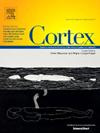快速的听觉和音素处理依赖于左颞平面
IF 3.3
2区 心理学
Q1 BEHAVIORAL SCIENCES
引用次数: 0
摘要
在对语音信号进行最初的双侧声学处理之后,随后的语言处理大部分是左偏侧的,这可能是由于左半球(LH)在快速展开语音成分方面的优势。在这里,我们研究了在短(25毫秒)或长(250毫秒)时间窗内变化的调频(FM)扫描刺激的方向性判断能力受损时,左脑损伤是否以及在哪里预示了这种损伤。中风幸存者的表现明显较低(n = 50;18名女性)比对照组(n = 61;(34名女性)对FM横扫的判断,尤其是短横扫。支持向量回归损伤-症状映射显示,部分左颞平面(PT)与短频扫描的较差表现有关,控制了长频扫描的表现。然后,我们研究了该区域的损伤是否与停止辅音识别和假词重复的能力下降有关,这在理论上取决于快速听觉处理。事实上,在控制病变大小和听力的情况下,有PT病变(PT病变+,n = 24)的参与者在顿音识别和假词重复方面的表现比没有PT病变(PT病变-,n = 26)的参与者更差。PT损伤对假词重复的影响大于对真实单词重复的影响,这一点很有趣,因为假词仅仅依赖于语音感知和排序,而单词也可以依赖于词汇-语义知识。我们得出的结论是,左PT是处理短时间窗口内听觉信息的关键区域,它也可能是听觉到语言处理的重要转移点。本文章由计算机程序翻译,如有差异,请以英文原文为准。
Rapid auditory and phonemic processing relies on the left planum temporale
After initial bilateral acoustic processing of the speech signal, much of the subsequent language processing is left-lateralized, perhaps due to a left hemisphere (LH) advantage for rapidly unfolding components of speech. Here we investigated whether and where damage to the LH predicted impaired performance on judging the directionality of frequency modulated (FM) sweep stimuli that changed within short (25 msec) or longer (250 msec) temporal windows. Performance was significantly lower for stroke survivors (n = 50; 18 female) than controls (n = 61; 34 female) on FM Sweeps judgments, particularly on the short sweeps. Support vector regression lesion-symptom mapping revealed that part of the left planum temporale (PT) was related to worse performance on the short FM sweeps, controlling for performance on the long sweeps. We then investigated whether damage to this region related to diminished performance on stop consonant identification and pseudoword repetition, which theoretically depend on rapid auditory processing. Indeed, participants with PT lesions (PT lesion+, n = 24) performed worse than those without (PT lesion-, n = 26) on stop consonant identification and pseudoword repetition, controlling for lesion size and hearing ability. PT lesions impacted pseudoword repetition more than real word repetition, which is of interest because pseudowords rely solely on speech sound perception and sequencing, whereas words can also rely on lexical-semantic knowledge. We conclude that the left PT is a critical region for processing auditory information in short temporal windows, and it may also be an essential transfer point in auditory-to-linguistic processing.
求助全文
通过发布文献求助,成功后即可免费获取论文全文。
去求助
来源期刊

Cortex
医学-行为科学
CiteScore
7.00
自引率
5.60%
发文量
250
审稿时长
74 days
期刊介绍:
CORTEX is an international journal devoted to the study of cognition and of the relationship between the nervous system and mental processes, particularly as these are reflected in the behaviour of patients with acquired brain lesions, normal volunteers, children with typical and atypical development, and in the activation of brain regions and systems as recorded by functional neuroimaging techniques. It was founded in 1964 by Ennio De Renzi.
 求助内容:
求助内容: 应助结果提醒方式:
应助结果提醒方式:


